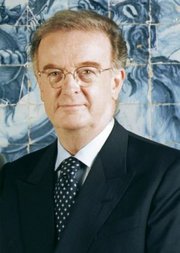Jorge Sampaio
|
|

| |
| Order: | 5th President of Portugal (since the Carnation Revolution) |
|---|---|
| Term of Office | January 14, 1996 - |
| Predecessor: | Mário Soares |
| First Lady: | Maria José Ritta |
| Date of Birth | September 18, 1939 |
| Place of Birth: | Lisbon, Portugal |
| Religion: | Agnostic |
| Political Party: | Socialist |
Jorge Fernando Branco de Sampaio (Template:Audio) is the current Portuguese President of the Republic, elected for a second term in January 14 2001.
| Contents |
Background
He was born in Lisbon on September 18 1939 in a family of partial Jewish descent. The Sampaio family lived abroad in the United States and England for some years, due to the professional activity of his father, a doctor. He started his political career as college student of the Law School of the University of Lisbon. Jorge Sampaio was involved in the student contestation against the fascist regime and was leader of the Lisbon students union between 1960 and 1961. Following his graduation in 1961, Jorge Sampaio started a notable career as a lawyer, often involved in the defence of many political prisoners.
After the Carnation Revolution of April 25 1974, Jorge Sampaio funded MES (Portuguese acronym for Social Left Movement) but abandoned the political project soon after. In 1978 he joined PS, the Socialist Party, where he remains to present day. His first election as a deputy for Lisbon in the Portuguese National Parliament is in 1979. Between this year and 1984, he was a member of the European Commission for Human Rights, where he developed important work on these topics. Between 1986 and 1987 he was president of the parliamentary bench of the Socialist Party. In 1989, he was elected president of this political group, an office he held until 1991. Also in 1989, Jorge Sampaio was elected mayor of Lisbon and re-elected in 1993.
Presidency
In 1995, Jorge Sampaio announced his wish to run for the presidency of the Republic. He won the election in the first round against Aníbal Cavaco Silva, a former prime-minister, and became president in January 14 1996. After a non-controversial first mandate, he was Portuguese presidental election, 2001 re-elected for President in January 14 2001.
As President, his actions are focused on social and cultural affairs. In the international political scene, he gave important publicity to the cause of East Timor's independence.
Jorge Sampaio's presidency has always been marked by a firm sense of prudence and moderation, an approach which earned him a remarkably uneventful first term in office. In 2004, however, his refusal to hold early elections following Social Democrat Prime Minister José Manuel Durão Barroso's resignation met with vigorous protest from all left-wing parties and even led to the stepping down of Socialist leader Eduardo Ferro Rodrigues. Sampaio made this decision to insure political stability in a time when the country is facing economic recession and appointed Pedro Santana Lopes as Prime Minister. However, only four months afterwards, on November 30, Sampaio considered that the new cabinet was not achieving in stability, quite the opposite, and dissolved the Parliament, calling new elections to February 2005.
See also
On February 24, 2005, President Jorge Sampaio called on José Sócrates Pinto de Souza, as the nation’s next prime minister, to form a government.
External link
- Official Site of the President of the Republic (http://www.presidenciarepublica.pt)
| Preceded by: Mário Soares | President of Portugal 1996 - | Succeeded by: (n/a) |
eo:Jorge SAMPAIO es:Jorge Sampaio fr:Jorge Sampaio gl:Jorge Sampaio is:Jorge Sampaio ja:ジョルジェ・サンパイオ nl:Jorge Sampaio no:Jorge Sampaio pt:Jorge Sampaio fi:Jorge Sampaio zh:桑帕約 he:ג'ורג'ה סמפיו
